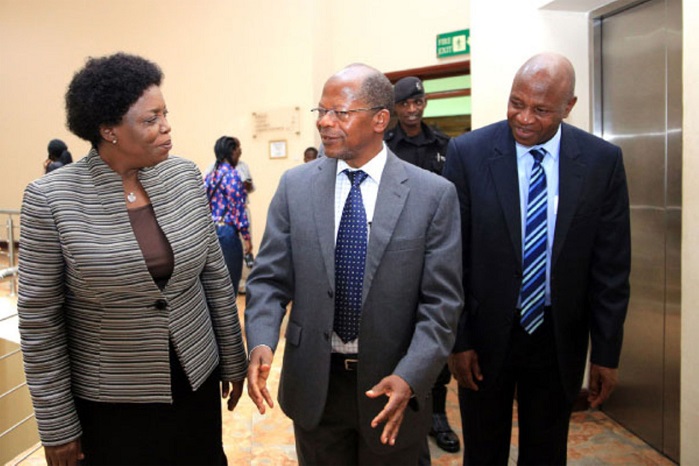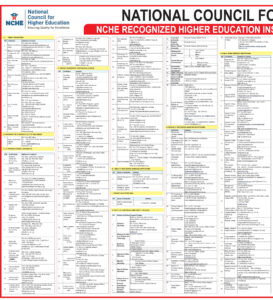
Professor Mary Okwakol, the NCHE Executive Director (L), speaking to Dr JC Muyingo (C), the minister in charge of higher education, and another official at the recent education forum
HABARI DAILY I Kampala, Uganda I Accreditation is one legal requirement that has been shunned by many a Ugandan institutions of higher learning, resulting into a threat of closure.
Higher education accreditation is a type of quality assurance and educational accreditation process under which services and operations of tertiary educational institutions or programs are evaluated to determine if applicable standards are met.
“You should ensure provision of transformative student education and learning, through attaining proper accreditation, lest your institutions will be banned,” said Professor Mary Okwakol, the Executive Director, National Council for Higher Education (NCHE).
In 2001, the Government founded the (NCHE), which provides accreditation of both universities and their programs leading to the award of bachelor’s degree, master’s degree, doctoral degrees, postgraduate diplomas and certificates, diplomas and certificates, issued an ultimatum for all institutions to be accredited. But many universities shied away from doing so.
The NCHE has therefore endeavored to come up with a list of recognized institutions of higher education in Uganda as at march 2025. These have either fulfilled the accreditation requirements or are enroute to doing so.
According to Prof Okwakol, in January 2019, they invited all universities holding provisional licenses beyond three years and an agreement was reached for each affected university to submit its roadmap to Charter acquisition to NCHE by end of April 2019.

 List of accredited institutions of higher learning
List of accredited institutions of higher learning
“I am glad to inform you that the majority of the affected universities did comply. We thereafter organized a monitoring exercise to the affected universities with the hope of providing the needed support for their progression to the Charter status,” she said recently, expressing hope that those Universities are working hard to fulfill the requirements of a chartered University.
She warned universities on the nature and conduct of how they are making affiliations contrary to Section 16 of the Statutory Instrument No. 34 of 2008.
“There are clear guidelines on how to effect an affiliation with the approval of NCHE. Unfortunately, a number of universities are not adhering to the above provision which could result into penalties in accordance with Section (17) of the same Instrument which stipulates that, “A person who contravenes these regulations commits an offence and is liable on conviction to a fine not exceeding one hundred currency points. So please, let us do the right things in an orderly manner.”
She urged institutions that have been granted a Charter to carry out continuous internal self-assessment after every two years.
“And a Charter shall be renewable after every five years after an external evaluation by the National Council,” she said.
Okwakol further noted that the practice of institutional self-assessment and peer-evaluation is a requirement in both public and private institutions.
She said they are on the verge of writing to all universities holding a Charter to demand that they comply.
To show that they have become more aggressive against institutions that are not compliant with their regulation, they recently published a list of universities whose licences they revoked. These include the following:
Lugazi University, whose license was revoked on 17/12/2010, Fairland University, revoked on 22/Mar/2015, Stafford University, revoked on 30/Nov/2018, and Busoga University, whose license was revoked on 27/Nov/2017.
Others whose licenses were similarly revoked include Namasagali University, revoked on (19/Dec/2008), Kayiwa International University – revoked on 16/Mar/2018 and Nsaka University, whose accreditation was revoked on 16/Mar/2018.
The NCHE has since issued a public advisory cautioning the general public against enrolling on unaccredited programmes and/or at unaccredited institutions.
“Please take note that any awards arising from unaccredited programmes or unaccredited institutions shall not be recognised. Where in doubt, members of the public are encouraged to seek the accreditation status of programmes or institutions with NCHE prior to enrolment,” reads part of the recently issued statement.
Habari Daily has since learnt that up to 10 universities face closure due to noncompliance to accreditation procedures. For the full list of accredited higher institutions of learning, please visit: https://unche.or.ug




